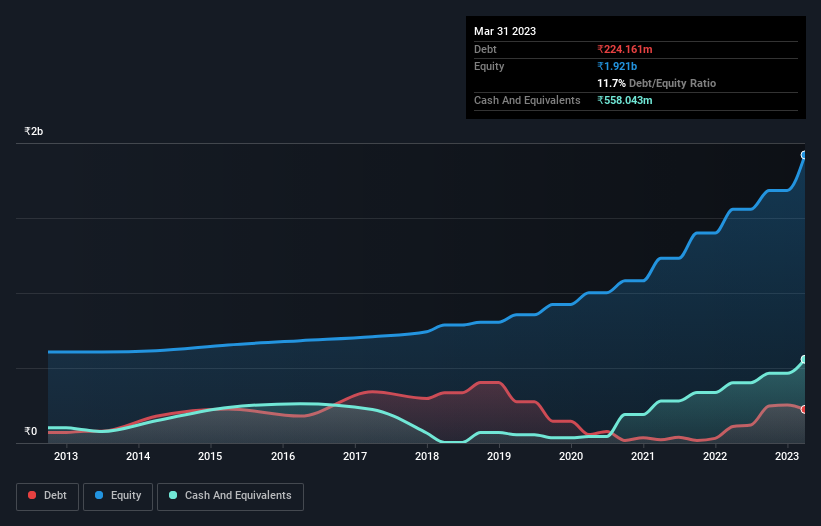Kothari Petrochemicals (NSE:KOTHARIPET) Seems To Use Debt Quite Sensibly
Some say volatility, rather than debt, is the best way to think about risk as an investor, but Warren Buffett famously said that 'Volatility is far from synonymous with risk.' It's only natural to consider a company's balance sheet when you examine how risky it is, since debt is often involved when a business collapses. Importantly, Kothari Petrochemicals Limited (NSE:KOTHARIPET) does carry debt. But should shareholders be worried about its use of debt?
Why Does Debt Bring Risk?
Debt and other liabilities become risky for a business when it cannot easily fulfill those obligations, either with free cash flow or by raising capital at an attractive price. If things get really bad, the lenders can take control of the business. However, a more usual (but still expensive) situation is where a company must dilute shareholders at a cheap share price simply to get debt under control. By replacing dilution, though, debt can be an extremely good tool for businesses that need capital to invest in growth at high rates of return. When we examine debt levels, we first consider both cash and debt levels, together.
See our latest analysis for Kothari Petrochemicals
How Much Debt Does Kothari Petrochemicals Carry?
As you can see below, at the end of March 2023, Kothari Petrochemicals had ₹224.2m of debt, up from ₹109.9m a year ago. Click the image for more detail. However, its balance sheet shows it holds ₹558.0m in cash, so it actually has ₹333.9m net cash.

How Strong Is Kothari Petrochemicals' Balance Sheet?
According to the last reported balance sheet, Kothari Petrochemicals had liabilities of ₹494.4m due within 12 months, and liabilities of ₹288.3m due beyond 12 months. Offsetting this, it had ₹558.0m in cash and ₹471.9m in receivables that were due within 12 months. So it actually has ₹247.2m more liquid assets than total liabilities.
This surplus suggests that Kothari Petrochemicals has a conservative balance sheet, and could probably eliminate its debt without much difficulty. Simply put, the fact that Kothari Petrochemicals has more cash than debt is arguably a good indication that it can manage its debt safely.
The good news is that Kothari Petrochemicals has increased its EBIT by 8.5% over twelve months, which should ease any concerns about debt repayment. There's no doubt that we learn most about debt from the balance sheet. But you can't view debt in total isolation; since Kothari Petrochemicals will need earnings to service that debt. So when considering debt, it's definitely worth looking at the earnings trend. Click here for an interactive snapshot.
Finally, while the tax-man may adore accounting profits, lenders only accept cold hard cash. While Kothari Petrochemicals has net cash on its balance sheet, it's still worth taking a look at its ability to convert earnings before interest and tax (EBIT) to free cash flow, to help us understand how quickly it is building (or eroding) that cash balance. Looking at the most recent three years, Kothari Petrochemicals recorded free cash flow of 23% of its EBIT, which is weaker than we'd expect. That's not great, when it comes to paying down debt.
Summing Up
While we empathize with investors who find debt concerning, you should keep in mind that Kothari Petrochemicals has net cash of ₹333.9m, as well as more liquid assets than liabilities. And it also grew its EBIT by 8.5% over the last year. So we are not troubled with Kothari Petrochemicals's debt use. The balance sheet is clearly the area to focus on when you are analysing debt. However, not all investment risk resides within the balance sheet - far from it. We've identified 3 warning signs with Kothari Petrochemicals (at least 1 which is a bit concerning) , and understanding them should be part of your investment process.
At the end of the day, it's often better to focus on companies that are free from net debt. You can access our special list of such companies (all with a track record of profit growth). It's free.
Valuation is complex, but we're here to simplify it.
Discover if Kothari Petrochemicals might be undervalued or overvalued with our detailed analysis, featuring fair value estimates, potential risks, dividends, insider trades, and its financial condition.
Access Free AnalysisHave feedback on this article? Concerned about the content? Get in touch with us directly. Alternatively, email editorial-team (at) simplywallst.com.
This article by Simply Wall St is general in nature. We provide commentary based on historical data and analyst forecasts only using an unbiased methodology and our articles are not intended to be financial advice. It does not constitute a recommendation to buy or sell any stock, and does not take account of your objectives, or your financial situation. We aim to bring you long-term focused analysis driven by fundamental data. Note that our analysis may not factor in the latest price-sensitive company announcements or qualitative material. Simply Wall St has no position in any stocks mentioned.
About NSEI:KOTHARIPET
Kothari Petrochemicals
Engages in the manufacture and sale of petrochemical products in India and internationally.
Flawless balance sheet average dividend payer.
Market Insights
Community Narratives


Recently Updated Narratives

TAV Havalimanlari Holding will fly high with 25.68% revenue growth


Fiducian: Compliance Clouds or Value Opportunity?


Q3 Outlook modestly optimistic
Popular Narratives


MicroVision will explode future revenue by 380.37% with a vision towards success


The company that turned a verb into a global necessity and basically runs the modern internet, digital ads, smartphones, maps, and AI.



